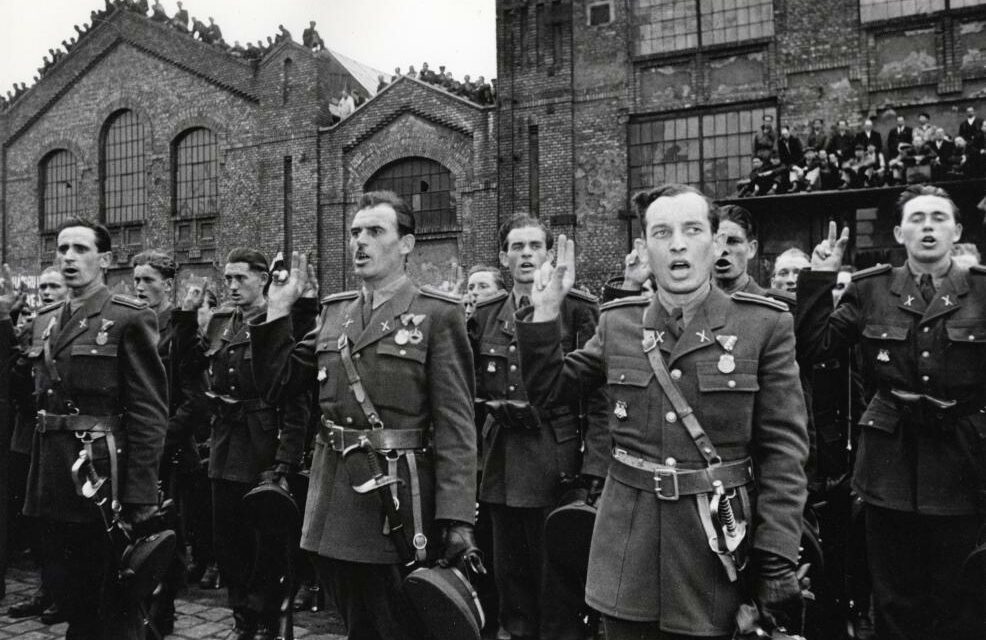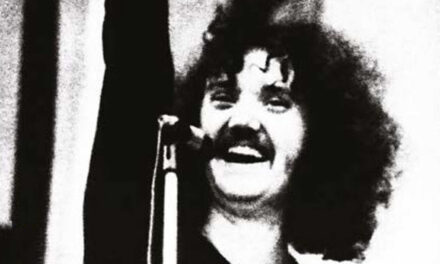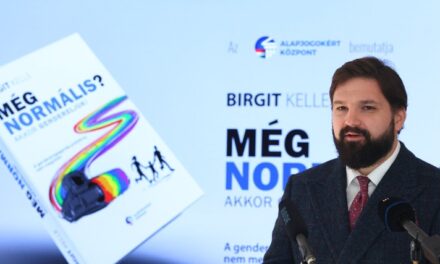The historian Zsuzsanna Borvendég's series was originally published on the PestiSrácok website, but there are certainly those who missed it. But those who haven't read all the parts should also read it again. Knowing the whole picture, can we understand how we got here?
The story of the hero - anti-hero - of the following article is in demand for a film. Károly Junger had an amazing career in communism as the son of a Zalaegerszeg rabbi. Working at the Hungarian trade branch in Frankfurt, he played a key role in the socialist-Western deals, using all means, undoubtedly working skillfully. Miklós Bauer also his maintenance officer at the ÁVH . In the mid-fifties, he changed, defected and worked for a large German company.
The Hungarian trade office in Frankfurt was a particularly important secret service base for Hungarian intelligence, while - in the absence of diplomatic representation - official relations with the emerging Federal Republic of Germany were also managed through this mission for years, but its most important task was still the consolidation of economic cooperation. István Bródy, a new, reliable comrade was needed at the station, so Károly Junger was there.
Károly Junger was born as the son of a rabbi from Zalaegerszeg.
After graduation, he obtained a diploma at a one-year commercial academy, with which he started working at the United Izzo in 1937. During the war, he performed labor service, escaped to join the approaching Red Army in 1945, and then returned to his workplace after the fighting ended. He worked as a material buyer and - according to the data of the state security - acquired a huge fortune through black trade during the inflation. Junger was organized by the ÁVH under the pseudonym "Áron Gábor" in 1950, so he ended up as an agent in Frankfurt, where he was also a member of Andreas Brody's Soviet resident network.
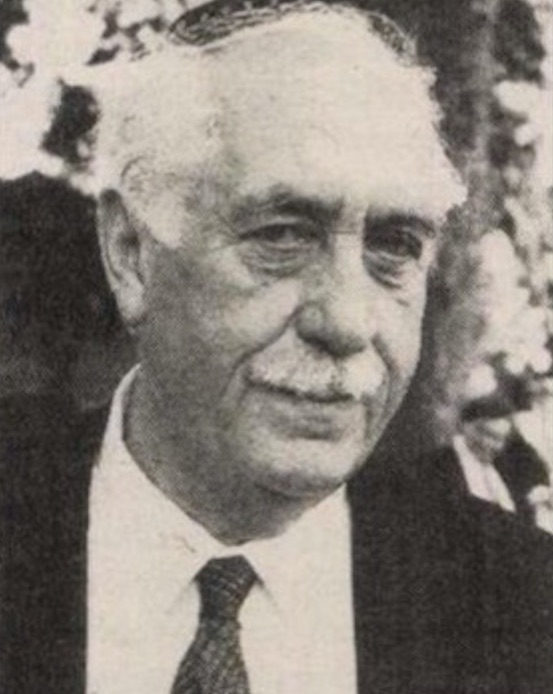
photo: Zalai Hírlap
He was undoubtedly talented
Junger excelled not only in the establishment of economic relations, but also during the Cold War secret service games, there is no doubt about his talent. The cooperation agreements that defined the main directions of Hungarian foreign trade before 1956 are linked to his name. For example, he allowed Karl Bickenbach , whose unrealistic commissions we already mentioned in a previous section.
Of course, Junger's operation also attracted the attention of counterintelligence; the CIA launched covert operations Henne to expose Junger's operation and then to turn the dealer over. The key man of the operation Helmut Triska , the Triska who, as the head of the Main Office of Imperial Security in Budapest, was one of the key figures of the secret service of the Third Reich in the region.
Later, the Americans demanded his services and used him in intelligence operations under the guise of business. He became an insider of the company called Atlas, the creation of which was assisted by both the Soviet and American secret services at the dawn of the Cold War.
Junger's holding officer was also Bauer
The Americans were aware that Junger was an agent of the ÁVH and believed that this would give them an opportunity to penetrate behind enemy front lines. They even knew that Junger's guard was the infamous "claw" Bauer, i.e., lieutenant colonel Miklós Bauer By the way, Bauer was of János Nyerges at this time, the Nyerges who remained one of the gray eminences of the foreign search network until the mid-eighties.
Bauer therefore got to know and actively helped the development of the financial relationship system that settled in our country with its mafia-like methods and contributed to its looting while still at the ÁVH.
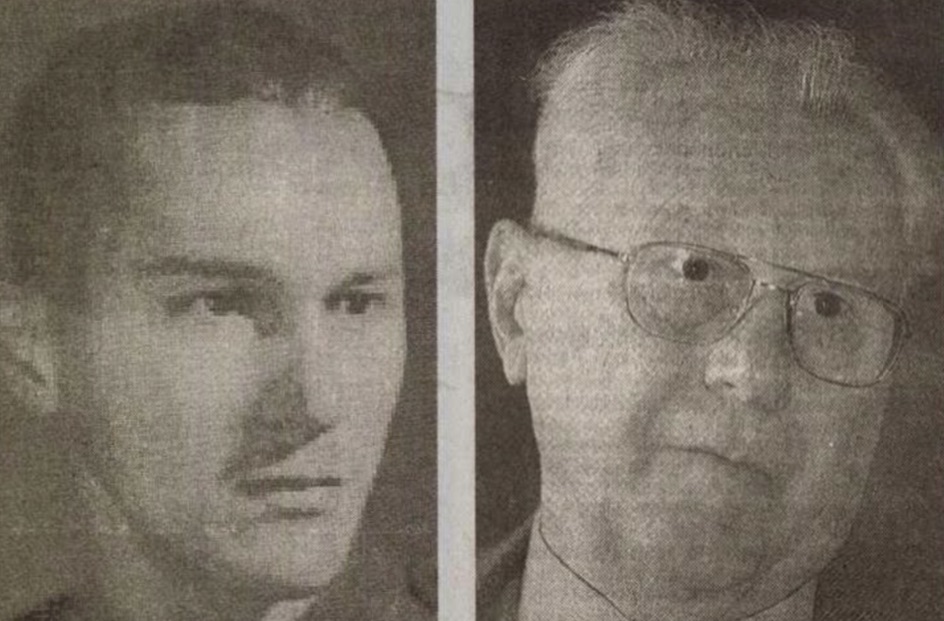
photo: Magyar Hírlap
Junger was able to win trade quotas for Hungary that surprised even the Americans.
After the Second World War, it was common in Western markets for individual countries to enter into annual agreements with each other, in which they set trade quotas for certain goods for the next 12 months, but the Eastern Bloc countries naturally had much stricter regulations, which were further aggravated by embargo provisions. .
Ex-Nazis are showing up again
As a result, the Hungarian foreign trade representation had to conduct tough negotiations with the German ministerial bodies to increase the number of employees and to procure the embargoed raw materials and products - not without results. A number of former Nazi diplomats, already familiar from earlier parts of the series, helped the Hungarian trade administration to conclude favorable contracts for them, despite the fact that the Hungarian side had already accumulated huge debts by the beginning of the 1950s.
Junger corrupted several people involved in trade policy in order to influence the trade quotas for Hungarians in a favorable direction - but what exactly this meant can be understood through a specific story. Bruno Süssmilch was the referent of the Interstate Department of the Ministry of Food, who - as we are slowly getting used to - also had a Nazi background. Süssmilch gave information to Junger about the directions of German trade policy, according to the CIA's assumption, not knowingly, but during harmless conversations provoked by the Hungarian agent.
A fruitful business relationship
However, from Junger's reports we see that Süssmilch was not as naive as the Americans thought. Junger regularly hosted the ministerial employee, occasionally showered him with gifts, and Süssmilch - under his state security code name: "Tejes" - also asked for favors from the Hungarian trade attaché when appropriate. During 1951, he came up with the idea that the Hungarians would help him leave the state employment, since he was not earning enough to make a decent living from it. Through Junger, he asked the Hungarian secret service to hire him as a commercial agent in the company owned by Bickenbach Let's remember: Bickenbach was also a Nazi figure who, before 1956, entwined our country's foreign trade to the West almost like an octopus, pocketing huge commissions from it. Süssmilch's request also indicates that the entire system was built with Hungarian assistance, and this does not praise Bickenbach's business qualities.
Süssmilch referred to the fact that his network of contacts could be of great help to the company providing the Hungarian representation, since he could remedy the import difficulties. However, it would not have been beneficial for Hungarian interests if Süssmilch were removed from the ministry, but they did not want to refuse his request either, as they could have lost his cooperation. In the end, Junger managed to convince him to stay in the office, but he was accepted as a secret partner in the company registered under the name of Bickenbach, from which he received a commission of six to seven hundred West German marks per month (apparently from Hungarian sources), just as much as his salary in the ministry.
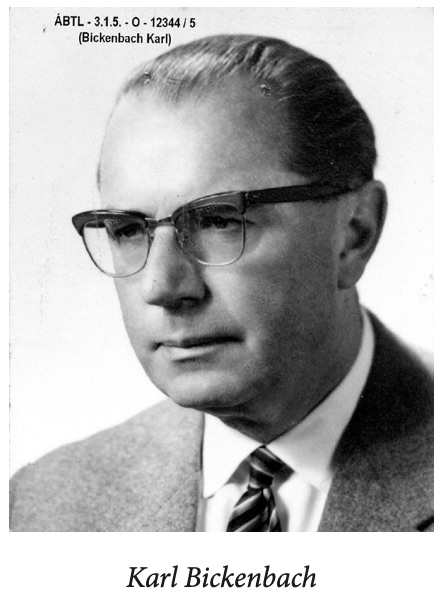
image source: ÁBLT
Süssmilch was not even ungrateful later on. He arranged, for example, that Hungary could once again export salami to Germany, which it had not been able to do since the war , because the German salami factories prevented the issuance of import permits. The issued quota made it possible to transport the meat product in the amount of 200,000 dollars. With the help of Süssmilch, the Hungarian companies were able to deliver three times the amount of wine included in the commercial contract to the FRG; with this, it was possible to sell more on the market of the country that had become an enemy than in friendly Germany before the war.
Süssmilch not only helped in the manipulation of trade quotas, but was also present at the German-Hungarian trade negotiations, where he constantly disclosed his own delegation's position and negotiation intentions, so the Hungarian side gained an advantage over the German partner.
The blackmail campaign of the ÁVH
However, Süssmilch left the ministry in 1953 and went to work for Bickenbach's company. The root cause was some kind of secret service blackmail operation in which the ÁVH compromised the German official , but the details of this are not clear from the surviving documents. In any case, this did not mean that the relationship between the Hungarian economic diplomacy (or secret service) and the German politician had been permanently severed: in the early sixties, he moved to Brussels to the organization responsible for agricultural affairs of the Common Market, and János Nyerges was still a potential informant for economic intelligence . saw in it.
And what happened to Junger? The Americans had been watching him from the beginning, they wanted to transfer him, that is, they wanted to turn him into a double agent , so when the notorious leaders of the ÁVH were arrested in 1953, they expected that Junger would also be sent home, who, fearing that he would be held accountable, might refuse to return home and requests asylum. But it didn't happen that way. Before long, Junger was indeed called home, but not to arrest him, but to escape from the clutches of the American Secret Service.
State Defense knew that Junger was a target of the enemy services; they also considered the possibility of collaborating with the Americans, but in the end this was rejected. Junger also made embargo purchases, and in 1952, during one illegal shipment, the goods were intercepted at the Swiss-German border. Junger bribed the inspection officials with ten thousand West German marks to let the shipment go on.
The equipment arrived at the block, but the US authority responsible for enforcing the COCOM list began an investigation and the threads of the investigation led to Junger. The United States secret service pressured the West German police to arrest the Hungarian foreign trade attache, so the ÁVH thought it better to call him home immediately.
Junger was employed at home
Junger was temporarily given tasks at home, he was not allowed to go abroad. He became the head of the export-import department of the Ministry of Foreign Trade, and then worked for Technoimpex. In the winter of 1955/56, they took the risk of traveling to the West again, and sent him to South America for half a year, where he was tasked with finding partner companies - he achieved serious success. In October 1956, Junger was again in Argentina on a business trip. On his way home, at the beginning of November, he was instructed by the new government to stop in Vienna and negotiate with the Red Cross organization there.
He stayed at the Hungarian embassy in Vienna until the end of November, when - at his request - his family came to see him. Junger then announced that he did not intend to return to Hungary, and decided to emigrate with his relatives. Soon, he was employed by the West German Thyssen concern, became the commercial director of the Essen smelter, and his first trip led to Argentina, where he previously built up his relationships on behalf of Hungarian companies.
Junger's rapid career in the West suggests that he was well known by the Western business world - and by the secret services as well - and it is no coincidence that he reached a high position in one of the most important West German companies. Even though certain circles suspected that the Hungarian intelligence might have taken him down on purpose, I found no indication of this in the state security documents. A few years later, Thyssen sent the Hungarian trader to Argentina, who eventually settled here with his family and founded his own company.
In 1991, the following article was published about him in the Zalai Hírlap:
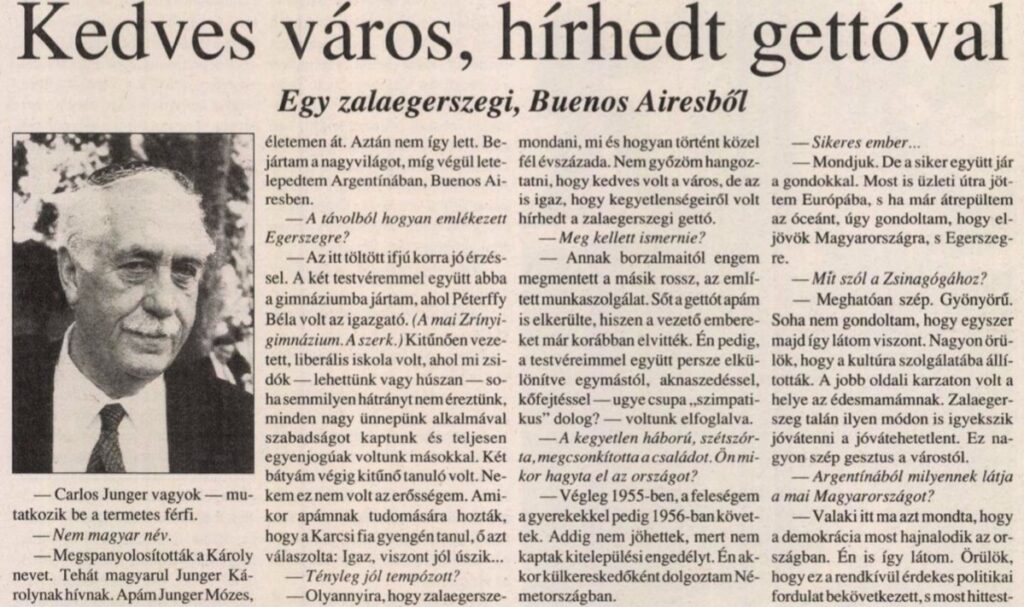
article: Zalai Hírlap
(to be continued)
Source: PestiSrácok
Author: historian Zsuzsanna Borvendég
(Header image: Fortepan)

